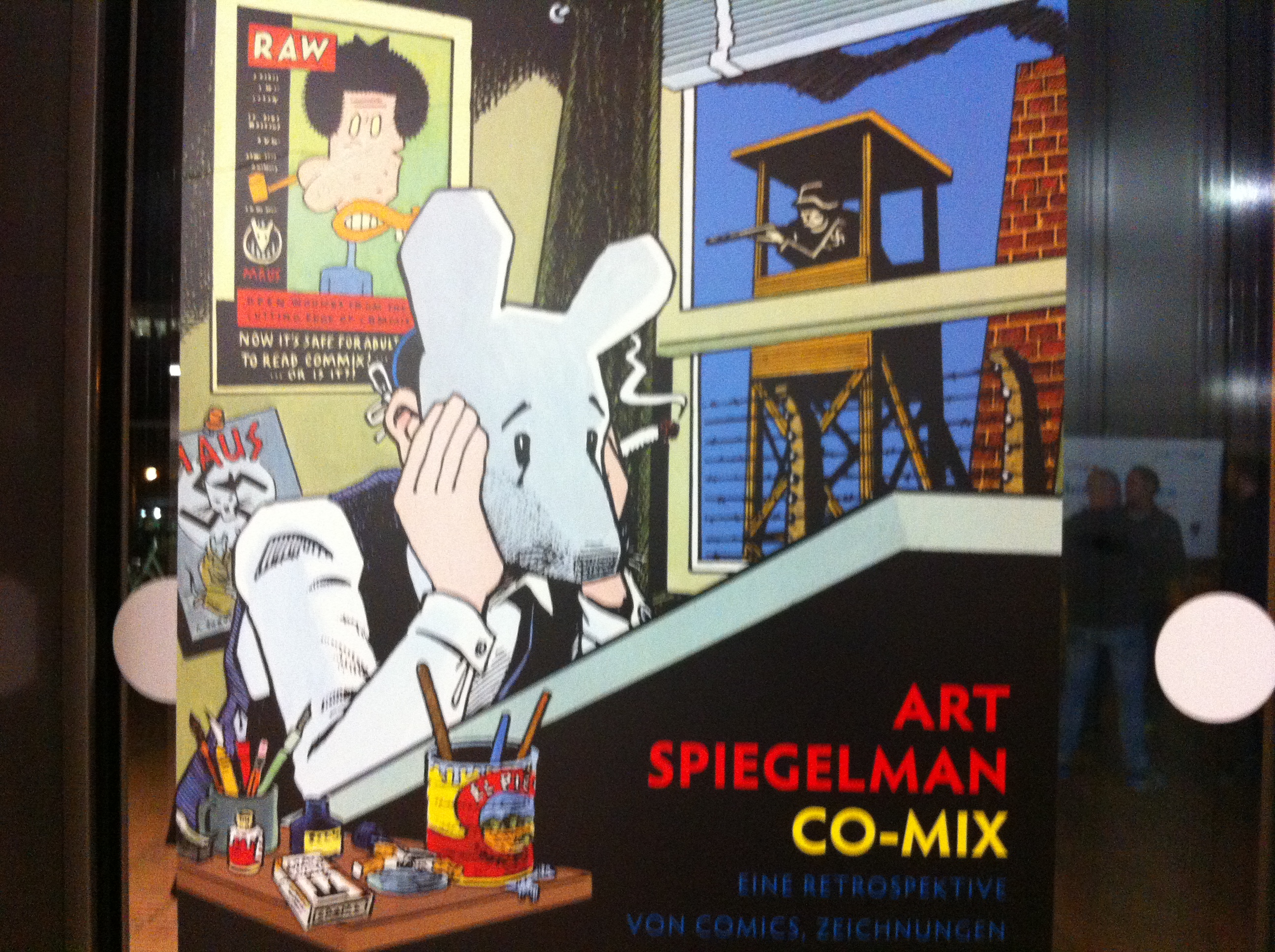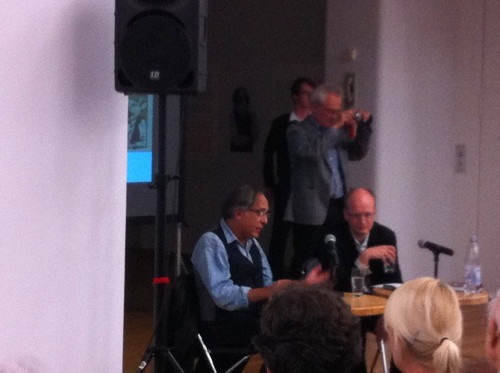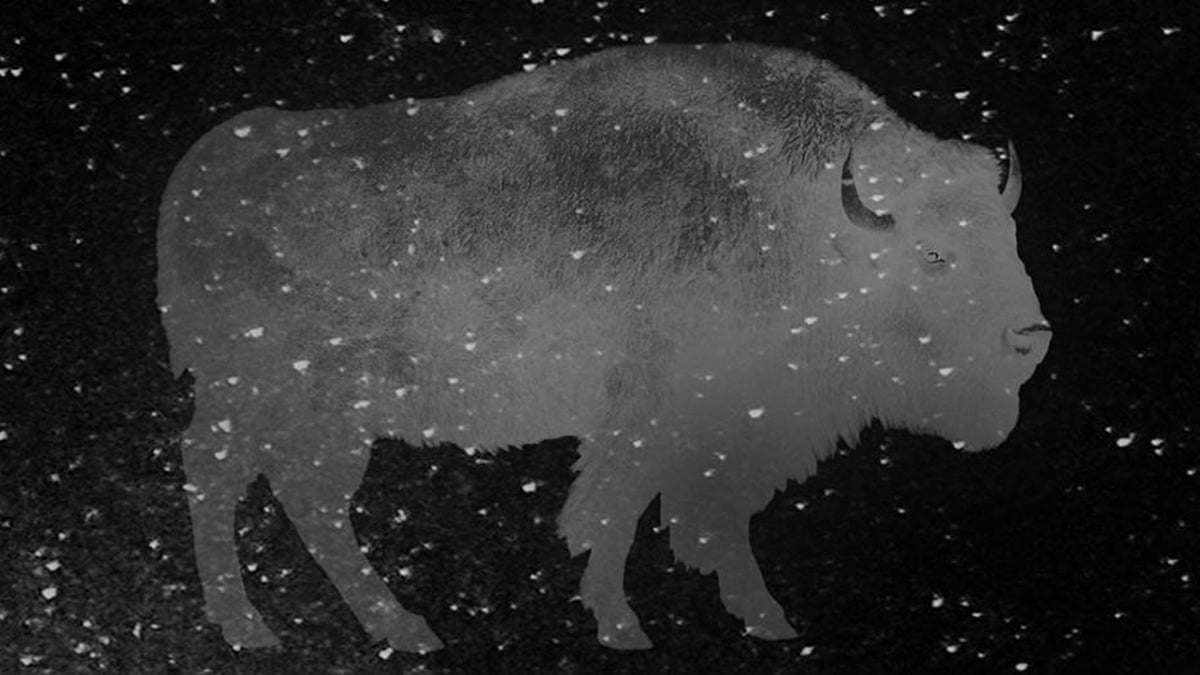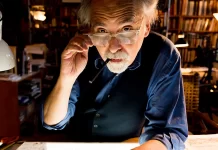by Brian Heater
[Sometime Beat contributor and Daily Cross Hatch founder Brian Heater happened to be in Cologne, Germany when he literally bumped into Art Spielgelman and Françoise Mouly earlier this week. Spiegelman was in Cologne for the opening of an art exhibit of his work. Heater attended Spiegelman’s talk the night before the opening, and the result is below.]
“How does it feel to be here, surrounded by cats?” The moderator’s already off to an auspicious start, given his (what I believe to have been, given my complete lack of German comprehension) promise not to discuss “why mice, why the holocaust.” It’s the proverbial gorilla in a room full of cats, of course, and while Spiegelman has visited the country a number of times in the past 25 years or so, it seems an odd choice not to discuss it the day before the opening of a retrospective on the cartoonist’s work. And here we are, like clockwork, dipping our toes in the water, the moderator asking how it feels sitting in this room, being, you know, the guy who got famous by writing a comic book about the Holocaust.And Spiegelman doesn’t flinch, taking puffs from what looks like a black electronic cigarette with a blue-glowing tip. He’s found the Germans to be a personable sort on his visits to the country—it’s the Austrians, he jokes, that he’s got a bit more trouble with. The Germans have looked Fascism in the face and spent the last several decades dealing with those consequences. There are, after all, still establishments in this country that allow smoking inside, unlike the fascistic New York governments, he jokes, taking another drag from the strange European device between his fingers for effect.
For the most part, the moderator makes good on his promise, bouncing back and forth through his career, asking about influences like Harvey Kurtzman (making reference to the exhibition’s “What Me Worry in Germany” subtitle) and Robert Crumb, and Spiegelman seems perfectly happy to discuss these matters. For Mad, he explains, the cartoonist had developed the backronym “Mom and Dad,” the child of holocaust-surviving immigrants unable to properly introduce their young son to American culture. Crumb, like Kurtzman, “ruined my life,” he adds, elevating the artform while influencing and entire generation of cartoonists to draw like him.
But shifting to the subject of Spiegelman’s career of flirtations with controversy, we’re back to square one, a discussion of the artist’s tendencies toward religion gadflyism (“I’m not sure if you know this,” Spiegelman says of a New Yorker piece depicting the story of Jesus played by a cast of apes, “but people in America don’t believe in evolution”). The still-fresh news of Innocence of Muslims opens a discussion of about 2006’s cartooning riots (the single moment, perhaps, when comics had the most profound impact on world events) and, by extension, Spiegelman’s participation in Iran’s holocaust denial comics.
And it’s strange to see this crowd of cats, awkwardly gathered around a space in the museum lobby clearly not built to house such a crowd, react to the images. Asked ahead of the event how a group of German intelligencia would respond to Holocaust joke strips from a Jewish-American cartoonist, I’d almost certainly have imagined a far more uncomfortable response. After all, like Spiegelman, I’ve found the Germans to be nice to a fault on my visits to the country—not only nice, but downright apologetic for their troubled past, the cab driver picking me up from the airport on my first visit to Berlin immediately launching into a monolog regarding the city’s decision to name the stadium street after Jesse Owens upon discovering that he was giving a ride to three Americans.
But while Germany continues to be a country painfully aware of the horrors of its past, on this latest trip, I’ve discovered a country that, like any other, possesses its share of xenophobia, a cab driver the night before bemoaning the construction of a nearby mosque to two American and one Canadian / Parisian passengers on their way to an Italian restaurant. Perhaps it’s because Cologne isn’t quite so metropolitan a city as Berlin—or maybe it just takes more than two days in a country to properly understand what its people are attempting to tell you. Tonight, it’s a room full of German art lovers laughing with delight at holocaust comics drawn by a Jewish American cartoonist.
It’s surreal, in a sense—nearly as surreal as unexpectedly bumping into Art Spiegelman and Francoise Mouly at an outdoor strip mall in Cologne, Germany, as I’ve landed in town for a business trip. “I’m being interviewed at the Ludwig Museum,” Spiegelman tells me, adding with a smile, “don’t worry, It’s in English. I can’t speak any other languages.
Two night’s prior, I find myself in my hotel room, watching and not understanding German television after a long, stressful day weaving in and out of throngs on the convention center floor. There, devoid of context for a world travel who cannot competently speak any language but English, is a man dressed as Hitler for a comedy sketch. Spiegelman, I think, would have approved, telling the room full of cats that he’s never accepted German limitation of speech on the matter, confident that any conversation that does not escalate into violence can ultimately lead to rational thought.
And perhaps, if comics’ most impactful moment resulted in violence over the depiction of a religious figure, the medium also possesses the ability to heal wounds both old and new. If so, laughter will be the force driving that conversation.










Great interview and angle to it . Btw electronic cigs are quite popular here in the US as well, or so it’s been my experience on the West Coast -my girlfriend switched to them (with blue glowing tip and all) and they are very much like the real thing, and you can smoke them anywhere as it’s vapor and not actual smoke. Leaves no smell or anything. As a former smoker i know i marvel at it lol…who would have thought.
Enjoyed that piece. I’m not quite sure about the German’s being a people painfully aware of their past though (and hear I speak as a non-German but one who has lived there for around 2 years). I think that depends on the age group. I’ve lived in both Berlin and Cologne and they are competing cities – Cologne was the art capital of the country and closely allied to Bonn ( a town now largely gutted by the move of Government to Berlin) – Berlin now is. There is a certain resentment amongst the normal people of the Rhineland about this movement away of influence and power. Many openly dislike the process of unification and the money the West poured into the former East. Cologne is the home of Festival, Germany’s Gay culture, Taschen books and much more, it’s a very artistic place. It may have worries about building of mosques as this is the new for them – the largely Turkish populations using Mosques have not been well established in this area. However in Berlin, a city somewhat thrown together by the Government policy in the cold war years of supporting artists at zero tax and the opening of borders to the East – a true cultural melting pot – they have had a large Turkish population for many years. Cologne may exhibit the low level xenophobia that almost all cities do when the resident population sees ‘The New’ coming over the horizon (we have it in Britain – sure you do in the US also) but it is the most tolerant of cities. Berlin, on the other hand, whilst it has become a cosmopolitan World city only needs a scratching of the surface to see less tolerant attitudes more to the fore. I live with a German – she is sorry for her people’s part in the War but asks isn’t the learning from history thing meant to be so we can move forward? not forever relive the mistakes of the past. Like many young Germans she is fed-up with having to be associated with something she had no part in and does not really feel ‘painfully aware’ other than by dint of the fact the rest of the world will never let her forget it.
Comments are closed.